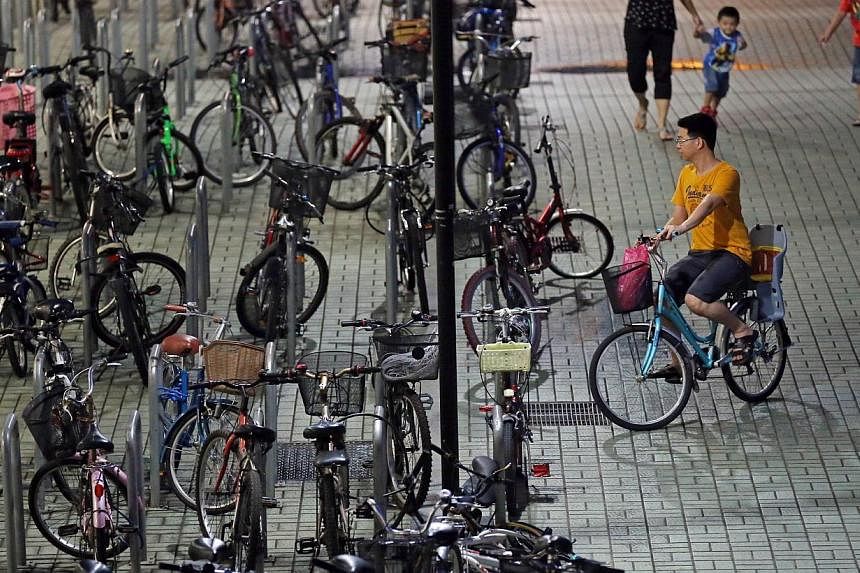SINGAPORE - National Development Minister Khaw Boon Wan said on Wednesday that cycling should not be just a recreational pursuit, but also a viable transport option for short trips around Singapore.
However, he noted that cycling makes up just 1 to 2 per cent of transport modes here. What is getting in the way of Singapore becoming a city of two-wheel pedallers?
The Straits Times found five reasons:
1. The lack of on-road cycling lanes
In recent years, calls by cycling enthusiasts have been made to the Government for cycling lanes to be introduced. They have cited the bike lanes in Taipei, London and Amsterdam as approaches in other cities for local authorities to consider.
In March 2012, Dr Janil Puthucheary, an MP for Pasir-Ris Punggol GRC, asked the Transport Ministry during a Parliamentary debate to consider re-examining the idea of bicycle lanes, and also asked if a line could be painted on the left-most lane as an alternative suggestion to bicycle lanes. This painted line would serve as a visual guide for motorists on the 1.5m clearance they must give when passing cyclists.
In response, Transport Minister Lui Tuck Yew said that demarcating on-road cycling lanes may give both cyclists and motorists "a false sense of security" and lead to more accidents.
Since then, the Government has announced that it would focus on building off-road cycling paths, with an islandwide cycling-path network spanning over 700km due to be completed by 2030.
Parliamentary Secretary for Transport Muhammad Faishal Ibrahim has also said that implementing bicycle lanes on roads would be considered in selected areas, but not on a nationwide scale.
2. Space constraints
Singapore being a land-scarce city has been one of the arguments against bicycle lanes - which cycling enthusiasts say will contribute towards more taking to cycling as an alternative mode of public transportation.
Dr Puthucheary has tried to make a case for these lanes, by saying in March 2012 during a Parliamentary debate: "It's hard to understand how London and Manhattan, two of the most dense and congested cities in the world, can effectively implement bicycle lanes to good effect, but we cannot."
Still, Prof Faishal has said that adding bicycle lanes will require more land or the narrowing of roads, with an adverse impact on traffic.
To which Dr Park Byung Joon, head of the Master of Urban Transport Management Programmes at SIM University, counters: "There is a saying: 'If you build it, they will come'. Are we waiting for people's mindsets to change before we build up, or do we build first, then wait for people to use it?"
3. Motorists' attitudes towards cyclists
Even if we get the infrastucture in place, there remains the problem of attitudes.
Cyclists here say motorists here are not very accommodating of cyclists on the road.
Commercial pilot Andrew Spencer, 32, cycles weekly on Singapore roads. The Australian, who moved here from Perth two years ago, was quoted in The Straits Times in 2012 as saying that "cars and buses in Perth would always give a wide berth to bikes". "They wouldn't cut in front and then jam on the brakes to make a turn," he said of motorists he has encountered here.
President of the Safe Cycling Task Force Steven Lim has said that having hardware is insufficient. "The software, like gracious behaviour, has to be in place too. We have to bring in the whole package," he told The Straits Times in November 2012.
4. The general public's perception about the weather
One reported grouse is that some perceive the local weather as too hot and humid for cycling in.
Dr Puthucheary has spoken out against this mindset: "This (assumption) is clearly wrong. Look at the many "uncles" in their long pants and t-shirts that can be seen cycling with ease in Kallang, Geylang, Redhill and other areas. Look at the foreign workers who do not require high-tech lycra shorts nor expensive cycle shoes, and yet manage to commute very effectively, rarely even breaking into a sweat. Look at the number of cyclists in cities around South East Asia, cities that share our weather conditions. Look at the cyclists on our roads despite the assertion that it is not a viable mode of personal transport. It's all a matter of expectation and conditioning."
Still, there are many here who say they cannot do without the air-conditioned comfort a car can provide. Plus, motorists say a car gets them to their destination faster than if they were to ride.
5. Bicycle parking facilities
Cyclists here say there are insufficient spots for them to park their bicycles.
Just two months ago, The Straits Times reported about a cyclist who found a warning note taped to his bike, which he had chained to a carpark railing at the Sports Hub. The cyclist, 28-year old retail worker John Paul Relucio, said he had done so because the Singapore Sports Hub does not have bike parking sites.
"This is the Sports Hub. If you want to promote a healthy lifestyle, why don't you have bike parking spaces?" Mr Relucio asked.
Then there are those who ride to work, who lament that bicycle racks at the MRT stations nearest to their offices are often packed to the brim. Even if they can get a slot, they wish they could park their bicycles closer to their offices.
Some office building owners have been getting into the act of incorporating sports facilities such as shower stalls and bicycle racks for staff, but much more can be done.
There are already some wheels in motion.
In July, the Travel Smart Network programme was launched. It offers grants of up to $160,000 annually, for three years, to co-fund initiatives by companies to make their workplaces more supportive of flexible travel arrangements. For example, the grants can be used to build shower facilities or to install bicycle parking facilities such as lockers and racks to encourage cycling to work.
The Government has also said that more bicycle racks will be built at MRT stations, HDB blocks, amenities, schools and other places when there is demand, as part of the Land Transport Masterplan 2013.


